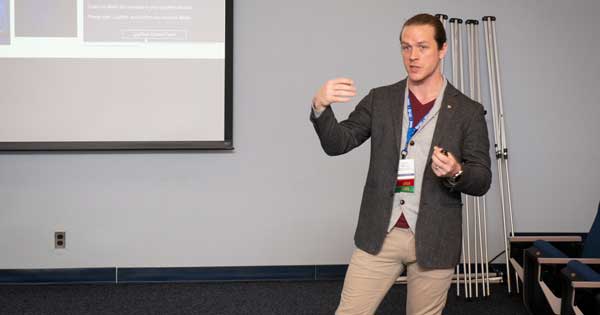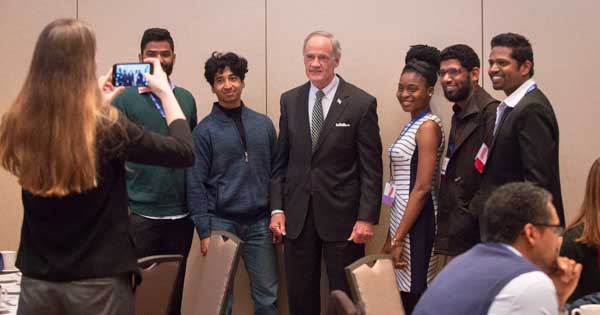


Transformative engagement
Photos by Wenbo Fan and David Barczak May 09, 2018
Forum shines a light on graduate research and creative works
Rishi Paudel roamed the University of Delaware Graduate Students' Forum with an eye toward improving his communication skills and learning new methods others are using in their research. A doctoral student in the physics department, Paudel studies sudden explosions of energy in low mass stars, called flares, in space, but he took a break from that to engage with his peers and learn what others are doing across campus.
Graduate student research and creative works on display and detailed through oral presentations covered a wide-variety of topics from advances in engineering high-efficiency solar cells to the analysis of breast cancer that has metastasized to the skin to the value of productive struggle in mathematics education, a technique that encourages student to persevere and think outside the box when solving unfamiliar problems.
Sponsored by the Graduate Student Government (GSG) and the Office of Graduate and Professional Education, the daylong event drew more than 300 graduate students, faculty and staff. The theme of the eighth annual forum was “Building Bridges: Advancing Research and Communication Across Disciplines.”
UD President Assanis called the event “transformative in so many ways,” and encouraged graduate students to think across campus and across the globe as they work to make a difference in the world.
“An interdisciplinary mindset—and the ability to understand and work with people outside your field—are essential to your success, whether your graduate education leads to a career in academia or in the public, private or nonprofit sector,” Assanis said. “Because when you can do that, you also help build and strengthen the bridges between what we do here at the University and what happens in the community.”
In the audience, Jordan Sawyer, an interaction design master’s student, nodded her head. Sawyer and her team have been partnering with Michele Lobo at the Move to Learn Innovation Lab on UD’s Science, Technology and Advanced Research (STAR) Campus to develop prototype devices designed to help children born with the neuromuscular disorder arthrogryposis multiplex congenita (AMC) overcome muscle weakness and fixed joints to perform independent tasks like feeding themselves. The work led the team to Nemours/Alfred I. duPont Hospital for Children where they presented and tested their prototypes with AMC families, patients, surgeons and therapists. Some of the prototypes already have a provisional patent, while others are still in development, but none would have come to fruition without collaboration and the input of others.
“The opportunity to design products that solve problems for people and enhance the user’s daily life has been a great learning experience, and partnership has been vital to our success,” said Sawyer, who earned her undergraduate degree in marketing at UD in 2017.
Projects like these also illustrate the deep and consequential contributions that graduate research makes. GSG member Stijn Koshari, a doctoral student in engineering, said it was energizing to “have a broader scope of what the world is doing, and to see how your research fits in with everything else.”
Ann Ardis, senior vice provost for graduate and professional education, underscored the value of graduate students to a university’s academic and research enterprise, as well as the ways they contribute to the development of the future workforce.
“Our graduate students play a critical part in research productivity and enhancing UD’s role as a tier 1 university with very high research activity,” Ardis said. “In addition, they serve as valuable mentors, coaches and role models for undergraduates, often ‘paying it forward’ by helping younger students learn the ropes or envision themselves in graduate school while preparing for their own next steps outside the UD campus.”
In his keynote address, U.S. Sen. Tom Carper called UD an institution that “punches above its weight” because it provides a training ground for graduate students to implement what he called the four C’s: communication, compromise, collaboration and civility. Fewer than 10 percent of people in the United States have earned a graduate degree, meaning those gathered were among a small segment of the population.
Carper, who earned his MBA at UD and has spent nearly 50 years in distinguished public service to Delaware and the nation, encouraged the graduate students to take their role seriously and “be the leader that others are looking for” by focusing on excellence in everything they do for society.
Sparking conversations, collaborations
Through dozens of presentations, forum attendees learned about research within the sciences, fine arts and humanities, including wide-ranging cross-disciplinary progress across thematic areas such as science, culture and civilization; health and disease; and environmental sustainability and climate change.
According to UD Graduate Student Government President David Maisson, the day was about creating moments where graduate students from different corners of the University might interact and potentially spark new conversations—or even collaborations—that otherwise might never have gotten started.
“Maybe it’s just a short conversation between people who love what they do,” Maisson said. “But maybe something crazy brilliant, the next leap forward, comes from one of those conversations.”
Imogene Cancellare, a doctoral student in entomology and wildlife ecology, chose to livestream her talk on molecular ecology and how science communication can help positively affect the conservation of snow leopards. Across the way, Kiersten Mounce, a doctoral candidate in art history, shared her work studying the revolutionary life and story of the chaise sandows, a utilitarian chair developed in the 1930s by the French architect René Herbst. Composed of tubular steel and brightly colored rubber bands, the chair stood in stark contrast to ornamental furniture traditionally produced in that era, Mounce said, and was considered a commentary on the intersection of design, industry, physical culture and national politics at the time.
Still others, like Elizabeth Bellotti and her fine arts colleagues, are carving out new ways to bring the arts alive by combining original musical scores and artwork. With original artwork representing the elements of air, fire, earth and water displayed behind her, Bellotti played an original score that used the French horn, clarinet, cello and percussion to represent the same elements with sound, creating a memorable moment that left audience members “with an image in their minds and a melody in their ears.”
“The scholarly and creative work that graduate students are doing at the University of Delaware goes far beyond just science research,” Maisson said. “There are others who are trying to advance us as a culture and a society, maybe by painting the next great painting or composing the next great symphony. All of this is important and had an opportunity to be shared at today’s forum.”

Contact Us
Have a UDaily story idea?
Contact us at ocm@udel.edu
Members of the press
Contact us at 302-831-NEWS or visit the Media Relations website

